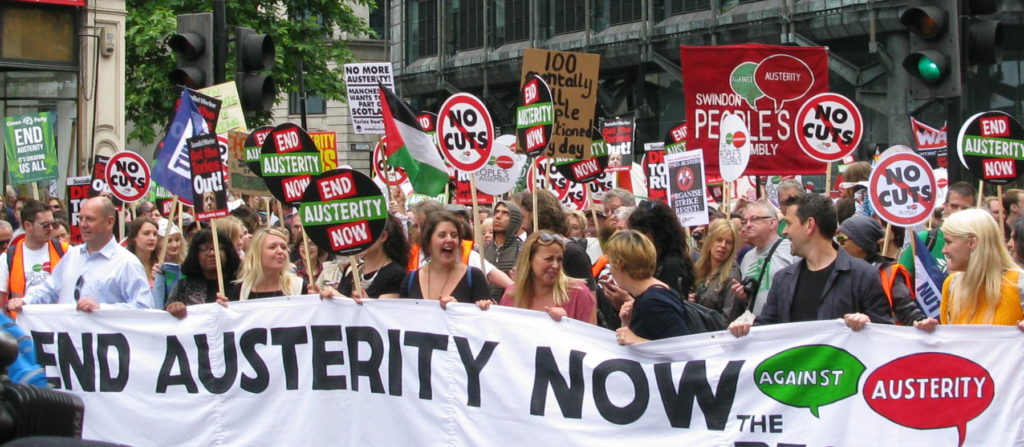Share buy backs and the failure of ‘Schrödinger’s capitalism’
The New York Times reported yesterday the return of corporate share buy-backs in the USA. When I tweeted the link to the story, someone replied with perhaps the best analogy I could come up with: this is like burning the house to keep warm.
Which it is. A share buy back essentially means this: the company board uses its profits not to invest in new research or in new machinery. It uses them to buy up its own shares. In the short term, this has a particular effect: because all of sudden the demand for these shares rises, the share price rises. Because the board’s bonuses are dependent on the price of shares – and because the fiduciary duty requires that boards of directors do that thing which maximises share value – it is always a temptation. But in the long run, it is essentially asset stripping. Rather than reinvesting in those things the company needs to continue to survive, the company is using its surplus cash to artificially inflate its value: burning the house to keep warm.
But what is crucial to understand in this story is that this measure is not a tale of desperate boards in desperate times. In fact, buy-backs have been rife since the 1980s. If we are to understand the collapse of the American car industry, for example, we must first understand that vast profits were poured by companies like Ford into this particular type of what Robin Ince calls Schrödinger’s capitalism. And as with the feline version, the problem comes when people looked in the box: whilst the short term trend is for increased share prices, in the longer term, investors realise that it is all a con trick.
But it’s more than a con trick. Ultimately, it undermines the key argument for capitalism. Because the clever capitalist will tell you this: ‘yes, capitalist systems can lead to exploitation. Yes, they can lead to inequality, and therefore to all of the social problems likely to result from this’. ‘But’, they say, ‘ultimately, capitalism is about driving new ideas. It is about setting entrepreneurs free so that they can fund the best ideas, the best research. And so, ultimately, it is needed to drive society forward.’
To put it another way, what they are saying is that when we work for a company, the profit resulting from our work should be handed to our bosses: to those who own the tools we use. Whilst this may cause short term social ills, they are the people who are best placed to invest it in new things which are good for generating new wealth – and so good for moving our society forwards. This is how they justify skimming wealth from our wages: this is how they explain their right to claim and accumulate the capital we generate. This is how they justify capitalism.
It is, of course, nonsense. The largest leaps forward in technology have come immediately after major wars, or space programmes – all state funded, through the state funded military industrial complexes, or through state funded university research departments. Most computer technology was developed after the mass expansion around the world of state funded higher education: much of it in Silicon Valley by the generation who studied at the University of California for free. Innovation comes not from a tiny elite of Übermensch to whom we should hand our economy, but from societies willing to invest in ideas.
But let’s assume for a second that we go with these capitalists for the sake of argument. Every month that goes by reveals new and exciting ways that the mega rich have found to squander all of the wealth they have pilfered from their employees, their customers, and the state: derivative markets, currency speculation, and the vast swimming pools which come with their self awarded spiralling wages. But share buy backs are a particular pernicious one. Because they demonstrate yet another way in which our capitalist system has totally and utterly failed at the one thing it claims to be good at: investing in new ideas, driving entrepreneurship. And they show how these brands which represented large industrial bases were slowly allowed to rot: because short term value was prized over their purpose. Rather than properly invest, company directors in the USA have found it quicker and easier to perform a conjuring trick which makes it look in the short term like the value of their shares has increased. And the short term, is, of course, all that exists in the quantum world of Schrödinger’s Capitalism.
So, next time a capitalist tells you that theirs is the only system which works, ask them this: “why should my boss get to steal a portion of my wages? Do you honestly think they can be trusted to do anything sensible with them?”



They’re doing so by simply participating in orientations designed particularly on their behalf.
They are very hush hush and we don’t want them knowing
my business. This form of prevention is often controversial and certainly it.
If you happen to find someone who catches your interest, then these may be things
for you both to think about and eventually discuss. Once you start speaking
to Russian women, it may be good to think about the differences in cultures that you
both might have, such as with religion and so forth. Recently, the most popular star on the network
of China must be the she male Queen from Thailand.
Matt – no, I don’t make that assumption. I say that it’s tempting for two reasons, one of which is bonuses linked to share value, but the other is about the fiduciary duties of the board – this is a good way to increase share value in the short term.
I’m not saying capital should be pooled in one business. Quite the reverse. By using capital to buy back shares, companies are inflating their value as things are, rather than investing in those new things you suggest they should invest capital in. Don’t take my word for it – just look at, say, the NYT article I link to, or at Ha Jung Chang’s explanations of the collapse of the American Auto Industry…
Adam, you seem to have a strange idea that share buy-backs are only ever about rewarding top managers.
That’s wrong and it a prejudice which doesn’t help your case.
Share buy-backs return capital from the business to investors, to allow them to, as you put it, “invest in new ideas, driving entrepreneurship. “.
You’re assuming that capital should be kept pooled in one business and never go anywhere else.
In fact, the capital which – for example – paid for the development of efficient diesel cars which have now reached maturity can be withdrawn and invested more efficiently in the development of something else, such as hydrogen propulsion or windmills.
That’s capitalism. And it works.
BTW what is the alternative system which has achieved more that you hint at but don’t identify?
Rgds
Lupin, you actually believe our economy is composed of and controlled by SMEs? As opposed to multinationals?
“while no doubt in some companies it could be truly said that the bosses take some of the workers wages for themselves without justification”
“What about Apple?” Precisely.
Good post, lots of good points – but hang on a minute. There are surely some great and innovative companies. What about Apple? And there are some very philanthropic business owners – like Bill Gates. Also, while no doubt in some companies it could be truly said that the bosses take some of the workers wages for themselves without justification, the underlying principal, that the owner has the idea, borrows the money, takes the risk, puts in the hard work at the beginning to build the company and continues to steer it in the right direction. This needs enough reward to motivate people to give it a go. He/she may also look after your working conditions and pension – she/he could be said to have created your job – in some cases at least.
Great post. I don’t know if you have come across William Lazonick’s work on this issue, but he makes exactly the same argument – worth checking out.